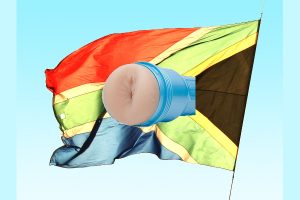Of South Africa, Sex Toys And Fake Fleshlights
 CAPE TOWN – Even as someone who works in the internet sector of the porn industry, I sometimes forget about the truly global nature of the adult entertainment business, especially when it comes to consumption of adult products in corners of the world which rarely pop up on my radar.
CAPE TOWN – Even as someone who works in the internet sector of the porn industry, I sometimes forget about the truly global nature of the adult entertainment business, especially when it comes to consumption of adult products in corners of the world which rarely pop up on my radar.
While I’m also reflexively skeptical of statistics relating to the industry, I don’t doubt one bit the notion the international reach, market penetration and revenue generation of adult products has grown immensely in the internet age.
One example of this significant expansion is the global market for pleasure products, or sex toys, or whatever your preferred moniker is for items ranging from vibrators and anal beads to sex dolls and bondage gear.
According to the Statistic Brain Research Institute (“SBRI”), annual worldwide sex toy revenue totals over $15 billion – and while my first impulse is to question how the SBRI came up with this number, other metrics relayed in the same report mesh with other sources and my own research.
One of those other metrics relates to the volume of Google searches for sex toys broken down by country. As of when the SBRI compiled these statistics, South Africa ranked third on the Google volume index for sex toy searches, a fact which some attribute to societal changes in South Africa, including a shift toward greater sexual exploration and experimentation.
“Sex toys have always been a taboo topic,” Brodie Meyer of Désir, a South Africa-based online adult store said in a recent interview. “Placing third, behind huge markets like the US and UK, shows how much progress has been made in allowing locals access to toys and the freedom to sexually express themselves in privacy and safety.”
Meyer also said recognizing this trend in South Africa several years ago is what led him to launch his company.
“Back in 2012, when we were conducting our own market analyses on growing online niches, the adult toy market was subtly picking up,” Meyer said. “We saw a demand for luxury items and open communication, and founded Désir.”
Meyer said there’s still progress which needs to be made in the South African sex toy market though, particularly when it comes to overcoming certain stigmas associated with the products.
“One of the main concerns that we have had to overcome since launching, is the lack of quality educational material on items that many consider to be part of a ‘smut-only’ industry, which is not the case at all,” Meyer said. “I believe that as we continue to break down stigmas, more people will feel confident enough to invest in their sexual health and in the happiness of their relationships.”
There’s another aspect of the South African market Meyer might want to keep an eye on, if Fleshlight’s experience with the country is any indication: counterfeit merchandise.
In 2016, Amazon reportedly received a significant number of consumer complaints about counterfeit Fleshlights being sold online, much to the chagrin of consumers who thought they’d found great deals on the popular masturbatory aid. Whether South Africa was the point of origin for the counterfeit Fleshlights which generated those complaints isn’t clear, but according to Erotic Trade Only, Fleshlight “recently conducted an anti-counterfeiting operation in South Africa, where a company was selling ‘poor quality knock-off’ versions of its Fleshlight Girls products to retailers and on the internet.”
Fleshlight indicated that, given the size of the company involved, the impact on the South African market for their products was significant, and the destruction of the faux merchandise marked “an important change in the sales dynamics of the company in question, which is now purchasing original products.”
“In addition, we would like to highlight the elimination of more than 85% of infringing offerings of fake goods, thus avoiding the propagation of internet offers of this nature and achieving a strong dissuasive effect among infringers worldwide,” the company added.













